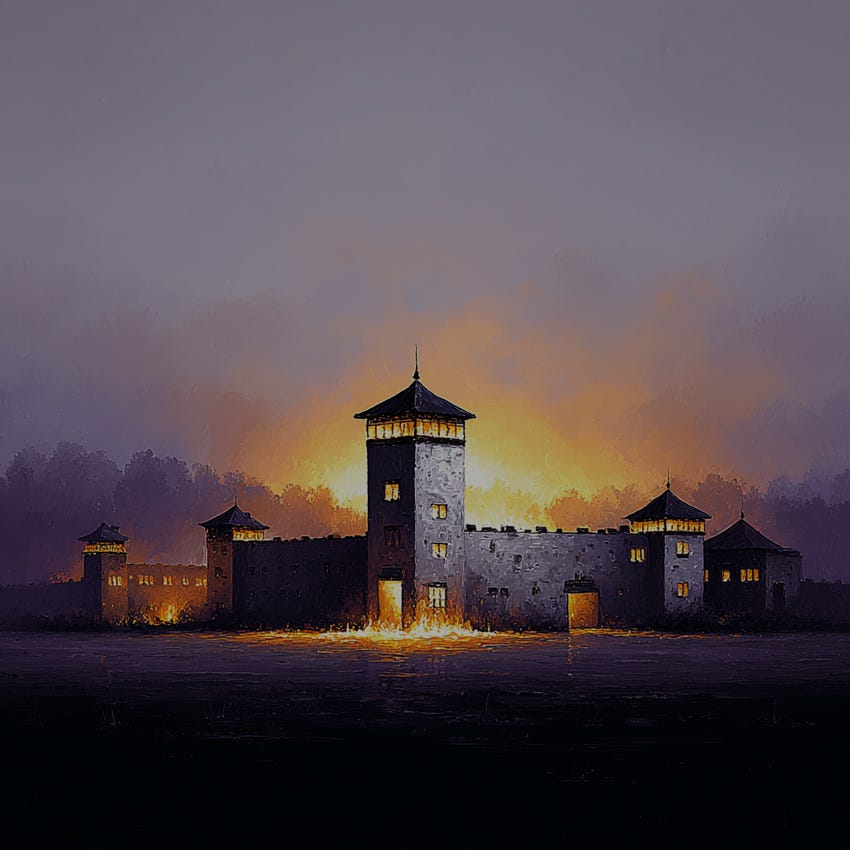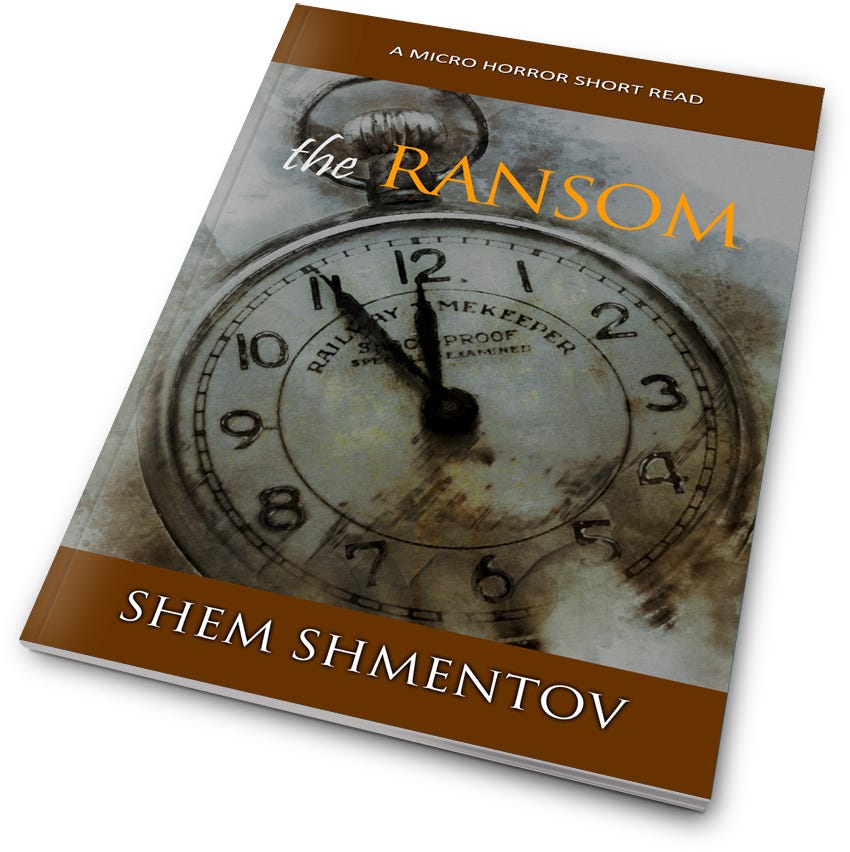The Stench, Finale
A Horror Story
Sight and Smell
The truth came to me in the quiet between screams.
I’d been starin at the chapel wall for hours, eyes gritty, when I noticed the stained-glass windows— Christ in white, surrounded by a halo of gold. In that light, the smell thinned to nothin.
It wasn’t just darkness Boone fed on. It was my darkness— my perception of evil. My “gift” was his tether. If I could cut the tether, he’d starve.
That’s when I realized the only way to keep from sensin evil… was to blind myself. Not just close my eyes. Destroy them.
I know. Seems… ghastly? I get it. It’s horrifyin to me, too. I grew up in a little Baptist church— except the folks in Autauga County pronounced it Babdis. Ma and pa took me there every Sunday. Ma made sure we went even after pa passed on. And we did go every Sunday mornin and Wednesday evenin until I went off to Europe to fight the Germans.
Our preacher was a stickler for the doctrines of the Bible— “God’s holy truth,” he called it. He said every word of it was about the Lord Jesus Christ in some way, shape, or form— “from Genesis 1:1 to Revelation 22:21.” Preacher Tim Timothy would point out things like Jesus not lookin like the pictures on most folks’ walls or on the stained-glass windows in a lot of churches. He’d preach, “Jesus didn’t have long hair! Look at the Word, First Corinthians and chapter eleven. Look at verse fourteen. What does it say? ‘Doth not even nature itself teach you, that, if a man have long hair, it is a shame unto him? ‘” Then he’d say, “Did Jesus ever do anythin shameful? He’s the second person of the Trinity who created nature. And Jesus wasn’t a Nazarite neither, because a Nazarite couldn’t drink wine or touch unclean things. Jesus touched lepers, raised the dead, and drank the juice of grapes. No, my friends, Jesus was a Nazarene, not a Nazarite, and the Lord didn’t have hair down to there.”
I looked again at the stained-glass image of what was supposed to be Jesus. My eyes saw it, but it wasn’t the Lord— didn’t even look like the Lord, accordin to scripture. Another verse came to mind, one that Pastor Timothy would preach from often— Second Corinthians, chapter five and verse seven. It said, “For we walk by faith, not by sight.” If my eyes are showin me somethin that wasn’t true, I had to trust by faith in what I knew was truth. Even the Lord Jesus Himself preached at the Sermon on the Mount, “And if thy right eye offend thee, pluck it out, and cast it from thee: for it is profitable for thee that one of thy members should perish, and not that thy whole body should be cast into hell.”
Guilt rested heavy on my heart. When I returned from the war, the pastor was kind enough to marry Rachel and me, I think hopin I’d get back to church. I didn’t. Besides, me and Rachel moved to Montgomery County right after I got work at Walls.
The thought hollowed me out. I had to give up my sight to stop the stench and halt this plague of evil. A life without sight. Never seein Rachel’s face again. Never seein dawn break over the Walls. But it was the only way Boone would lose his huntin dog.
Fisher of Men
I found two guards I trusted, Harrigan Thorne and Palmer Meadow. These two were men too scared to ask questions. I told them we were movin Boone to the mile. “For the warden,” I lied. They didn’t argue. Thorne and Meadow followed me to the cell block to fetch the convict.
On the way, I admitted to myself the sin at the heart of all this was pride. I’d thought my ability to smell evil made me righteous, holy somehow. And I used it to justify myself. If I was so holy, I thought, I don’t need to go to church. I’d sometimes tell myself that none of these other men could preach like Pastor Tim, so why go? And as far as my gift was concerned, my sense of smell only made me judgmental. Oh, yeah. There the words of Jesus stung. He said, “Judge not, that ye be not judged. For with what judgment ye judge, ye shall be judged: and with what measure ye mete, it shall be measured to you again.” When I judged the inmates, it was nothin more than a hook for Boone’s line. He was usin me as an adulterated fisher of men.
On the Mile
We wheeled in every floodlamp we could find, wirin them to the prison generator. The mile blazed white, shadows stripped from every corner. Boone appeared in the doorway. His smile, faint, the left corner of his mouth raisin ever so slightly, as if to mock me. His eyes, like wet coal.
“Without me, you’re nothin,” he said to me in a voice as soft as a warm hymn.
I grabbed the poker propped into the open front door of the furnace, which sat at the end of the mile. The heat shimmered against my face. “Without me,” I told him, “you’re starvin.” I drove the poker into my eyes. There was a strange pain that shuddered through my whole body as white light burst behind my lids— then nothin but black. The stench vanished in an instant.
Boone’s scream was the last sound I heard before I blacked out. But that sound was etched into my brain like a phonograph needle on Edison’s wax cylinder, a sound like metal tearin, and the heat of Boone rushin past me the moment the stench evaporated into a sightless canopy of crushed velvet.
Later, someone told me— a don’t recall who because I couldn’t place his voice— the walls shook, and alarms rang out everywhere. Fires also broke out in two blocks. Frank Minter told me that two guards pulled me into the yard as the Walls burned from the inside out. I vaguely remember gainin a bit of consciousness after bein dragged into the yard. I obviously couldn’t see the flames, but I remember feelin the heat against my skin before I passed out again.
Sound of Silence
I rested on possibly the most uncomfortable cot invented in all the days of mankind’s wrestlin with a good night’s sleep. The bandages across my eyes felt damp and warm, an annoyance that turned my seconds into eternal minutes and infinite hours. They say when you’re deprived of one sense, the others are heightened. Well, between the bed and the bandages, my sense of touch was workin overtime.
Although the stench was gone, my sense of smell seemed intact. My guess— I was in the hospital. There was somethin medical about the scent, not clean, but antiseptic. Since it was a place where livin organisms like bacteria came to die, the hospital was a place where most of us regular folk didn’t want to be— we were livin organisms too. I was told by someone years ago, can’t remember who, that the sense of taste was tied to the sense of smell. I can attest to that truth. I couldn’t enjoy a decent meal for years because of my “gift.” I can’t say I’m goin to miss it.
My sense of hearin was acute. I could hear the low, shallow breathin of a fellow patient who must have been two beds down from me. The breathin was overcome by the clip-clop of the worn leather soles of street shoes approachin from the far end of the ward. When the footfalls stopped at the end of my cot, a chill ran down my spine that nearly made my toes curl. I couldn’t help rememberin what Rachel told me about Mrs. Larkin, seein what she saw at the end of her bed. I heard metal scrape at the foot of the bed, and then a pen scribblin on a piece of paper. The metal clinked on the bed’s rail, and I assumed it was a medical chart.
“How are you feelin today?” inquired a deep baritone voice from a man whose accent betrayed Georgia, possibly Atlanta or thereabouts.
“You must be the doctor,” I said to him.
“I am. I’m Doctor Wedgewood.”
“Hey, doc, has there been any visitors for me? I expect my wife would have come by checkin on me. Rachel’s her name.”
“Not that I’m aware,” he said. “Do you know how long you’ve been here, in the hospital?”
“A couple days, I reckon. Seems longer though.”
“You’ve been in this bed for over three weeks, and until a few minutes ago, you’ve been in a coma.”
“A coma? You mean like unconscious?”
“Somethin like that. Do you know what year this is?”
“Sure. 1933. It was January when the prison caught fire.” I tried to sit up in the bed. That’s when I felt the manacles on both wrists connected to the cot. “Hey, what’s the idea here?”
“Do you know who you are and why you’re here?”
My mind was blank. I know my name. At least, I knew my name. I couldn’t answer. I drew a blank.
“Sometimes,” the doctor said soberly, “a trauma like what you’ve experienced can play on your mind, and you can have some trouble rememberin. Your name is Millard John Frymore.”
The silence that followed was deep enough to drown in, and I could feel the irritatin stink of a rope burn around my neck.
What did you think?
Leave a comment with thoughts on the story. The true horror for writers of this genre is there are so many subgenres in horror that the stories I write are certainly not for everyone. Not scary enough. Not enough jump scares. Too poetic. Not poetic enough. Not enough gore. Too psychological. Not psychological enough. Want more psychos. You get the idea. But honestly, I’m looking to improve as a writer, and I certainly value your input. So, as we used to say in the Navy (and perhaps still do… I’ve been out for a while), sound off.
Are you signed up?
If you haven’t subscribed, subscribe now so you don’t miss a single episode of other stories like “The Stench.” When you click the button below to subscribe, in the “Welcome” email you’ll also receive a link for a free horror story titled, “The Ransom.”




